What to do for Dog Diarrhea
If you have dogs in your house for any great length of time, you are likely to have experience with at least one bout of dog diarrhea. Beyond the pain in the tuckus involved in cleaning up the mess, you should know what causes diarrhea (so you can prevent it next time), and when it's important to see the vet.
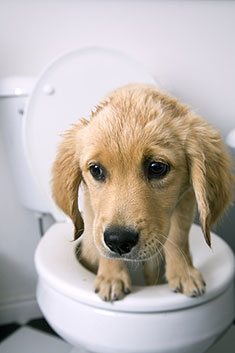
Causes for dog diarrhea
When your dog has diarrhea, you mostly just want it to stop, but you need to do a little detective work to figure out the cause, as the treatment can take very different paths, depending on the cause.
Acute dog diarrhea is that which lasts only a short time, and is usually caused by your dog eating something that doesn't agree with his tummy. Diarrhea is actually part of the body's defense mechanism, ridding the system of the toxic substance. It can be helpful to allow your dog to continue with the diarrhea until his system is cleansed. In this case, your treatment will center on keeping the dog from getting dehydrated by providing plenty of fresh water, but very little else.
Chronic dog diarrhea occurs when there are bigger problems. Chronic diarrhea is much less common than acute cases, and it usually lasts longer than a week or two. It may be caused by something simple like food allergies, or it may point to a harder-to-treat problem like inflammatory bowel disease or pancreatitis. Certain parasites like whipworms and roundworms may also cause diarrhea. Treatment of chronic diarrhea involves getting rid of the underlying problem, perhaps by using medications and a special diet.
Cleaning dog diarrhea
You likely clean the messes out of your yard on a somewhat sporadic basis, particularly if you live in a very snowy climate. However, when your dog has diarrhea, it is important to clean up quickly so that no other animal has the opportunity to investigate the puddle of stool. In the event that the diarrhea is caused by an infection, it can be passed to your other pets, as well as to wild animals through the stool.
As you are cleaning up, look for worms in the stool, which can be an important diagnostic tool for your veterinarian. You should also note the texture, amount, and color of the stool and tell your vet if you cannot bring a sample to the office. Certain infections will cause the stool to have certain characteristics that can help your vet to isolate the cause.
Finally, make sure to thoroughly wash your hands and any implements you used for clean-up. Use warm water and soap on your hands and lather for at least 20 seconds to kill any bacteria or viruses that may be present. Dip clean-up tools in bleach or alcohol to kill germs. Some of the bugs that cause dog diarrhea can infect humans, as well, so don't take a chance - wash up promptly after any possible exposure.
Treatment for dog diarrhea
To help your dog get over a case of diarrhea, it helps to cut the amount of fat and foods that can cause further upset. In humans, pediatricians often recommend the BRAT diet, which can be modified to help your dog regain his normal bowel habits. BRAT stands for bananas, rice, applesauce, and toast. For a day or two, this diet will be fine for your dog, but you may want to add some boiled chicken if you keep the dog on this diet for longer than 48 hours to provide for his protein needs.
For the first day or two, your dog's stomach is likely to be upset, and he may not have much of an appetite. Don't force feed the animal, and if you have more than one dog, you may want to feed the ill dog in another room so he won't eat just to prevent the other dog from getting all the food. As long as your dog is drinking water, you don't need to worry. He will begin eating again in a few days, as the stomach heals itself and rids the body of toxins.
If your dog stops drinking or develops signs of dehydration, it is time to check with the vet. Your vet may recommend prescription medications or may ask you to dose your pet with over-the-counter human remedies to stop the diarrhea. Pepto-Bismol for dog diarrhea, as well as Immodium and Kaopectate or their generic equivalents can be effective in treating your dog's diarrhea. You should only use these medications with the full knowledge and recommendation of your vet, as they may interact with other medications your dog is taking.
Signs of dehydration in dogs
The biggest danger of dog diarrhea is often the dehydration that can follow. This is particularly important if your dog is vomiting and has diarrhea. You can monitor your dog's water balance with a few simple tests. The dog's nose should be moist, as should his gums. If they are not, your dog needs fluids. If you pinch a little bit of skin at the back of the dog's neck, it should go back to it's normal shape within a second or two. If it remains tented, your dog needs fluids. Finally, pay attention to how often your dog is relieving his bladder. If urination stops, he is not getting enough fluids to offset the fluids being lost through diarrhea.
More on the bland diet for dogs
Once your dog is willing to eat, you will want to provide very bland foods at first, then work your way back to a normal diet. Continue feeding the BRAT diet, with supplemental boiled chicken until the diarrhea completely stops. Once your dog begins having more normal stools, you might begin adding yogurt to restore the helpful bacteria which the diarrhea likely has washed from your dog's intestinal tract. Then you might add mashed potatoes, cottage cheese, and sweet potatoes, one at a time.
As long as your dog tolerates each addition, keep adding a wider variety of vegetables. After a few days, you might want to try a half portion of the dog's regular food mixed with boiled chicken and some vegetables. If the dog tolerates that without any more diarrhea, you can revert to a more normal diet.
Doggies Den: Latest Articles
 Homemade Thanksgiving Treats for Your Dog
Homemade Thanksgiving Treats for Your Dog
NUTRITION We all want to include our dogs in our holiday celebrations, but hopefully, you're aware that sharing table scraps with your dog isn't always the best idea.
 Keeping Your Dog Safe during the Summer Months
Keeping Your Dog Safe during the Summer Months
HEALTH Summer is coming on fast, so it’s time to plan how you will keep your dog safe and healthy through the lazy, carefree, warm days.
 Vaccination Time Again-Keeping Your Puppy Healthy
Vaccination Time Again-Keeping Your Puppy Healthy
DOG HEALTH So you have your new puppy picked out. There are quite a few shots, treatments and examinations that will keep the newest member of your family healthy.
 Canine Thanksgiving Feast
Canine Thanksgiving Feast
NUTRITION With the wide variety of food at Thanksgiving dinner, chances are you'll want to give your dog something special, too. If you're contemplating what to feed your dog for the holiday, here is a guide to a great Canine Thanksgiving Feast.
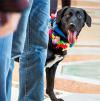 Dog Walking Tips Every Owner Should Know
Dog Walking Tips Every Owner Should Know
DOG FUN Walking your dog is not only crucial to keeping him healthy and happy, it strengthens the bond between your canine friend and his caregiver. There are a lot of obstacles out there. Don’t forget these simple tips to keep your walk fun and safe in the outside world.
 The Benefits of Physiotherapy for your Dog
The Benefits of Physiotherapy for your Dog
HEALTH The same techniques that physiotherapists use to treat a variety of injuries and conditions in humans have been adapted to suit animals with great success. Family pets, show dogs, and working dogs can all benefit greatly from physiotherapy. Dogs whose activities involve a lot of agility are especially susceptible to the types of problems that physiotherapy can address.
 The Decision- Adding a Dog to Your Family
The Decision- Adding a Dog to Your Family
FIRST TIME OWNERSBringing a dog into your family is a decision where many people don’t realize it’s magnitude until after they have the dog. There are a number of things that you need to research before you decide to purchase a dog, and it starts right in your own home.
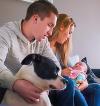 Bringing Your Dog Into Your New Baby's Life
Bringing Your Dog Into Your New Baby's Life
HEALTH Many believe that a dog and a new baby cannot happily coexist, so therefore the dog has to go. This is not necessarily the case.  A new baby does not mean you have to abandon your dog.

Doggies Den:
Most Popular Articles
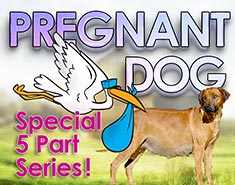
Dog Pregnancy Symptoms
HEALTHIf you suspect your dog might be pregnant, check out part one in this series on pregnant dogs, where we cover pregnant dog symptoms.
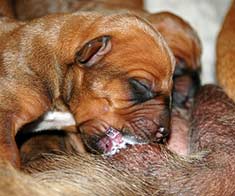
Dog Birth
HEALTHIn the third article of our dog pregnancy series, we look at the wonderful, but messy, process of bringing newborn puppies into the world.
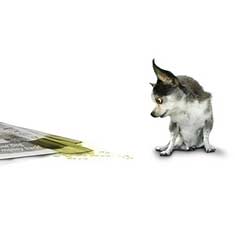
Indoor Dog Potties
DOG PRODUCTSIt's been a long day at work. You were so busy, you didn't even take time to eat a sandwich, let alone run home to let your dog out. You're on your way home, knowing the poor dog is crossing his or her legs by now, when your car breaks down, delaying you even further. Can't somebody make this easier?
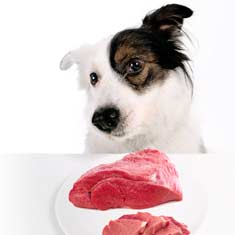
Your Dog’s Digestive System
PHYSIOLOGYEver wonder why your dog eats so fast? Or why he eats gross things? Or why he gets sick to his stomach? Or why his waste stinks so bad? Some of these things are normal, some are not.

Canine Respiratory System
BREATHINGThe basic function of your dog's respiratory system is to bring oxygen in to and remove carbon dioxide from the body. Knowing the symptoms of respiratory diseases can help you help your stay healthy.
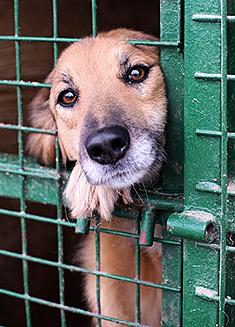
Shelter Dog Adoption Tips for Success
ADOPTION Are you intimidated by the prospect of "rescuing" a dog from a shelter? One reason that you may be wary of adopting a dog from a shelter is not knowing how to choose. Adopting a dog from a shelter can be a rewarding process, if you're prepared to do a reasonable amount of research.
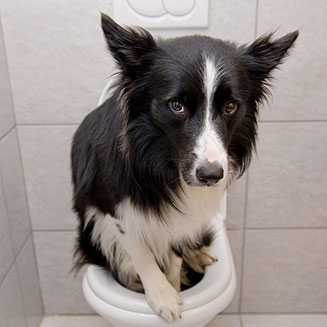
Canine Urinary Tract Infections
SYMPTOMS AND TREATMENTDoes your dog seem to be having trouble relieving his or her bladder? Learn how to recognize the signs of urinary tract infections and how to treat them before they spread.
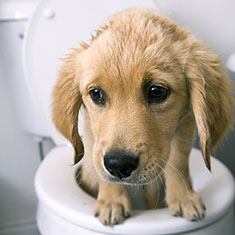
What to do for Dog Diarrhea
SYMPTOMS AND REMEDIESIf you have dogs in your house for any length of time, you have likely experienced at least one bout of dog diarrhea. Beyond the pain in the tuckus involved in cleaning up the mess, you should know what causes diarrhea, and when it's important to see the vet.
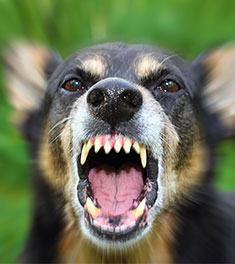
What to do for a Dog Bite
DOG BEHAVIOR Getting bitten by a dog can be scary, and you may be tempted to run around in circles for a while, trying to figure out what to do. Here's our guide to help you manage the situation.
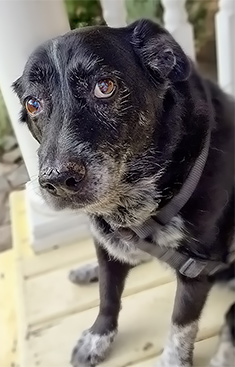
Top Ten Tips for Living with a Senior Dog
DOG HEALTH Bringing home a new puppy is so exciting, but it doesn’t take all that long for your exuberant puppy to grow into a senior dog who may have special needs. Here are the doggies.com top ten tips for taking care of your companion who has been with you through so much.
